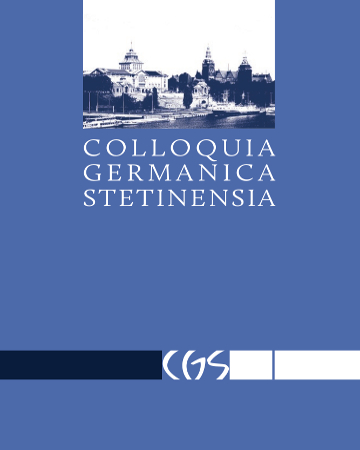







| Authors: |
Teresa Maria
Włosowicz

Akademia Ignatianum w Krakowie, Wydział Zamiejscowy Nauk Humanistycznych i Społecznych w Mysłowicach |
| Keywords: | multilingualism language processing cross-linguistic and intralingual interaction language awareness |
| Data publikacji całości: | 2018 |
| Page range: | 21 (221-241) |
| Downloads ?: | 468 |
| 1. | Arabski, Janusz. Przyswajanie języka obcego i pamięć werbalna. Katowice: Wydawnictwo Śląsk, 1996. |
| 2. | Bardel, Camilla, Laura Sánchez. „The L2 status factor hypothesis revisited. The role of metalinguistic knowledge, working memory, attention and noticing in third language learning“. In: L3 Syntactic Transfer: Models, new developments and implications, hrsg. v. Tanja Angelovska, Angela Hahn, 85–101. Amsterdam, Philadelphia: John Benjamins Publishing Company, 2017. |
| 3. | Bouvy, Christine. „Towards the Construction of a Theory of Cross-linguistic Transfer“. In: English in Europe: The Acquisition of a Third Language, hrsg. v. Jasone Cenoz, Ulrike Jessner, 143–156. Clevedon, Buffalo, Toronto, Sydney: Multilingual Matters, 2000. |
| 4. | Cook, Vivian. „Evidence for Multicompetence“. Language Learning 42 (1992): 557–591. |
| 5. | Cook, Vivian. „Competence and multi-competence“. In: Performance and Competence in Second Language Acquisition, hrsg. v. Gillian Brown, Kirsten Malmkjaer, John Williams, 57–69. Oxford, UK: Oxford University Press, 1996. |
| 6. | Cook, Vivian. „Multilingual Universal Grammar as the Norm“. In: Third Language Acquisition and Universal Grammar, hrsg. v. Yan-Kit Ingrid Leung, 55–70. Bristol, Buffalo, Toronto: Multilingual Matters, 2009. |
| 7. | De Angelis, Gessica. „Multilingualism and non-native lexical transfer: an identification problem“. International Journal of Multilingualism 2 (2005): 1–25. |
| 8. | De Bot, Kees. „A Bilingual Production Model: Levelt’s ‘speaking’ Model Adapted“. Applied Linguistics 13 (1992): 1–24. |
| 9. | Grosjean, François. „The bilingual’s language modes“. In: One Mind, Two Languages: Bilingual Language Processing, hrsg. v. Janet L. Nicol, 1–25. Oxford: Blackwell, 2001. |
| 10. | Grosjean, François. „An attempt to isolate, and then differentiate, transfer and interference“. International Journal of Bilingualism 16 (2012): 11–21. |
| 11. | Heine, Lena. „Mögliches und Unmögliches: Zur Erforschung von Transfererscheinungen“. In: Beim Schwedischlernen sind Englisch und Deutsch ganz hilfsvoll. Untersuchungen zum multiplen Sprachenlernen, hrsg. v. Britta Hufeisen, Nicole Marx, 81–96. Frankfurt a. M.: Peter Lang, 2004. |
| 12. | Herdina, Philipp, Ulrike Jessner. A Dynamic Model of Multilingualism. Perspectives of Change in Psycholinguistics. Clevedon: Multilingual Matters Ltd, 2002. |
| 13. | Herwig, Anna. „Plurilingual lexical organisation: Evidence from lexical processing in L1-L2-L3-L4 translation“. In: Cross-Linguistic Influence in Third Language Acquisition: Psycholinguistic Perspectives, hrsg. v. Jasone Cenoz, Britta Hufeisen, Ulrike Jessner, 115–137. Clevedon: Multilingual Matters, Ltd., 2001. |
| 14. | Hufeisen, Britta. Englisch als erste und Deutsch als zweite Fremdsprache. Empirische Untersuchung zur fremdsprachlichen Interaktion. Frankfurt a. M.: Peter Lang, 1991. |
| 15. | Hufeisen, Britta. „L3 – Stand der Forschung – Was bleibt zu tun?“. In: Tertiärsprachen: Theorien, Modelle, Methoden, hrsg. v. Britta Hufeisen, Beate Lindemann, 169–184, Tübingen: Stauffenburg, 1998. |
| 16. | Hufeisen, Britta, Nicole Marx. „Einleitung“. In: Beim Schwedischlernen sind Englisch und Deutsch ganz hilfsvoll. Untersuchungen zum multiplen Sprachenlernen, hrsg. v. Britta Hufeisen, Nicole Marx, 7–13. Frankfurt a. M.: Peter Lang, 2004. |
| 17. | Jessner, Ulrike. Linguistic Awareness in Multilinguals. English as a Third Language. Edinburgh: Edinburgh University Press, 2006. |
| 18. | Kellerman, Eric. Aspects of Transferability in Second Language Acquisition. Nijmegen, Katholieke Universiteit Nijmegen, 1987. |
| 19. | Klein, Elaine C. „Second versus third language acquisition: Is there a difference?“. Language Learning 45 (1995): 419–465. |
| 20. | Näf, Anton, Doris Pfander. „<Springing of> a <bruck> with an elastic <sail> – Deutsches im Englischen von französischsprachigen Schülern“. Zeitschrift für Angewandte Linguistik 35 (2001): 5–37. |
| 21. | Paradis, Michel. „On the representation of two languages in the brain“. Language Sciences 7 (1985): 1–39. |
| 22. | Paradis, Michel. „Language and communication disorders in multilinguals“. In: Handbook of the neuroscience of language, hrsg. v. Brigitte Stemmer, Harry A. Whitaker, 341–349. Amsterdam: Elsevier, 2008. |
| 23. | Sánchez, Laura. „‚Luisa and Pedrito’s Dog will the Breakfast Eat‘: Interlanguage Transfer and the Role of the Second Language Factor“. In: New Trends in Crosslinguistic Influence and Multilingualism Research, hrsg. v. Gessica De Angelis, Jean-Marc Dewaele, 86–104. Bristol, Buffalo, Toronto: Multilingual Matters, 2011. |
| 24. | Singleton, David. Language and the Lexicon. An Introduction. London: Arnold, 2000. |
| 25. | Singleton, David. „Perspectives on the Multilingual Lexicon: A Critical Synthesis“. In: The Multilingual Lexicon, hrsg. v. Jasone Cenoz, Britta Hufeisen, Ulrike Jessner, 167–176. Dordrecht, Boston, London: Kluwer Academic Publishers, 2003. |
| 26. | Włosowicz, Teresa Maria. „Some Applications of Translation to Psycholinguistic Research“. Linguistica Silesiana 33 (2012): 127–145. |